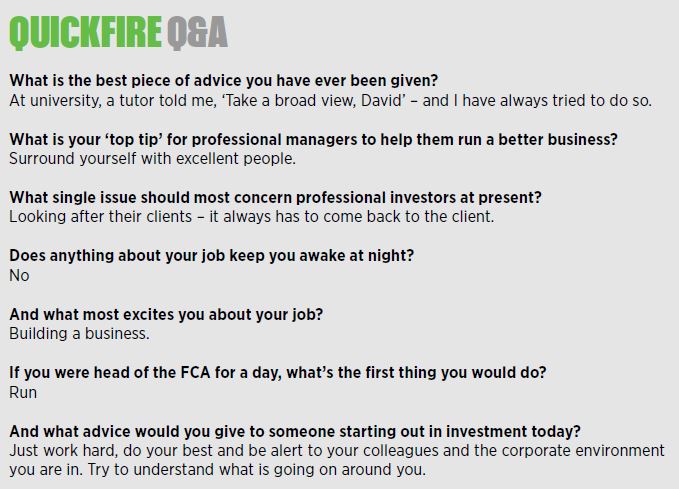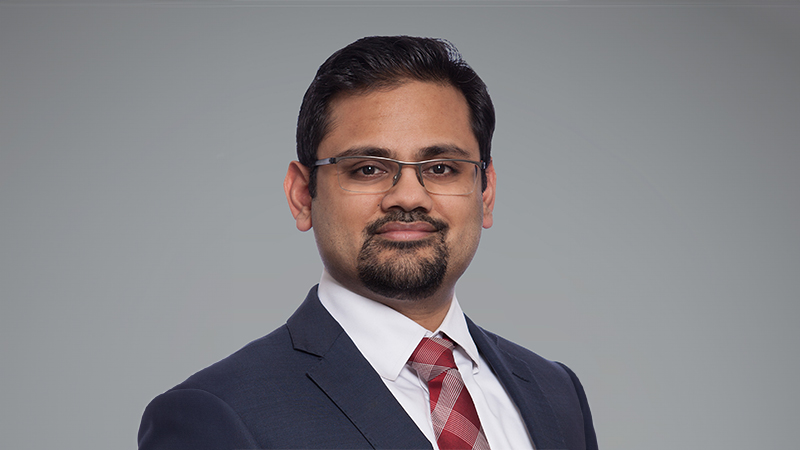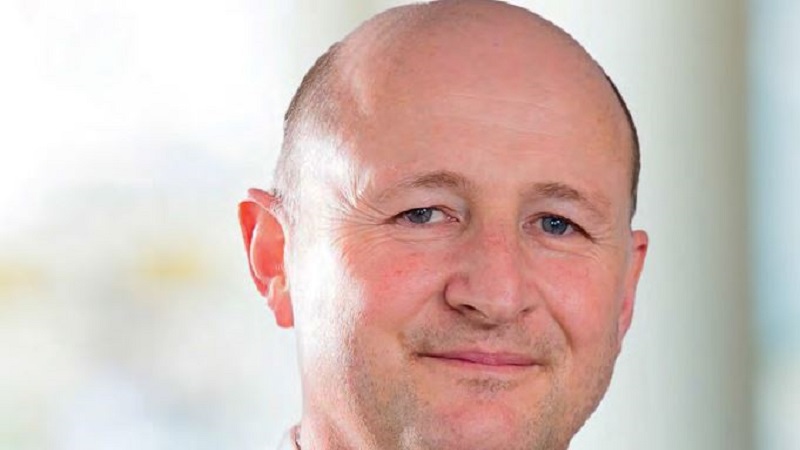With the benefit of hindsight, that most magical of all market-watcher’s powers, the three themes investors would have been happiest steering clear of ahead of March’s pandemic-induced crash would arguably have been value, smaller companies and the UK. Given these are precisely the areas towards which Seneca Investment Managers naturally gravitates, then, chief executive David Thomas appears remarkably stoic.
“We are value investors, we have a size bias towards mid-cap stocks and, as pretty much all of our clients are UK-based, we do have quite a large UK exposure,” he chuckles ruefully. “So all three of those big themes in our portfolios played against us in the Covid downturn, as growth outperformed value, larger companies outperformed small caps and pretty much every mature market in the rest of the world outperformed the UK.
“That said, we do have good lines through to our clients and, of course, we clearly explain our position before they buy.” Furthermore, notes Thomas, who took the top job at Seneca in April 2015, having previously worked in business development, investment and management roles at Momentum, Midas Capital, Cazenove and Flemings, the firm does not have to look too far back in time for a reassuring parallel.
“After the Brexit vote, we also underperformed for a while before seeing some very strong numbers as people gained confidence and rotated money out of areas that had been resilient and into assets that had fallen,” he says. “That really set us up for a couple of years of excellent performance. This time, while our investment trust and Oeics have risen strongly since the market nadir in March, we believe there is a lot more gas in the tank.”
On an investment level, then, Seneca appears to be meeting the challenges posed by Covid-19 with some confidence, but what about as a business? “We actually undertook a major overhaul of all our systems last year and so we felt we had a very strong operational base,” replies Thomas. “As a result, although there was a lot of hard work to do, we successfully moved everybody to working from home before the virus really got going.
“We were able to have an effectively functioning business without anything falling between the gaps. Staff all have the relevant equipment to work from home, provided by the company where appropriate, and we have done everything we need to do at a risk management, technological and operational level. The next stage is to make the office as safe as we can so those who wish to can come back in.
“Until the situation is a great deal clearer, we have no intention of specifically asking people to do so but it is obvious some colleagues like working from home while others really want to get back into the office. At this stage, then, the aim is to be able to cater for both, without obliging anybody to put either themselves or those they live with at risk.”
‘For the first time in ages, we have bought a US holding’
Of that trio of themes mentioned earlier, surely value is proving the hardest road to travel, so how is Seneca finding the going – both as investors and as a business seeking to attract clients into its multi-asset fund range? “As investors, we are finding value,” asserts Thomas. “In part, that is a function of our particular focus around mid-cap stocks – both in our own directly held UK portfolios and in the third-party managers we choose.
“Take, for example, the Morant Wright Fuji Yield Fund. More than half its holdings have net cash, it is run by a very active, very capable manager and yet it is on one of its lowest relative valuations to the main Japanese market for many years.” Thomas points to a similar story in the US, where the relative valuation between value and growth businesses is “as wide as it has ever been”.
“The US market has been very strong but it has been quite narrowly driven,” he continues. “Deep tech stocks on the Nasdaq may be trading around 70x earnings but, if you are prepared to move away from the big headline-grabbing mega-stocks, there is plenty of value to be found. So, for the first time in ages, we have bought a US holding – a value fund run by Conventum Lyrical, where the average holding’s valuation is below 10x.”
And as a business? “Commercially, we would never argue value or growth was absolutely the right place to be all the time,” replies Thomas. “Nevertheless, we have had a situation where a lot of value-type stocks have suffered quite a bit while a lot of growth – technology, healthcare, the big consumer stocks – have done well and been quite resilient in the Covid bear market.
“So you would really have to believe that is going to continue ad infinitum not to want to hedge your portfolio with an element of value at this stage. That is an argument we have used with DFMs and IFAs for quite a long time but it is all the more true now because value has underperformed – no two ways about it. So if value was cheap then, it is even cheaper now, and that view is resonating with both existing and potential clients.”
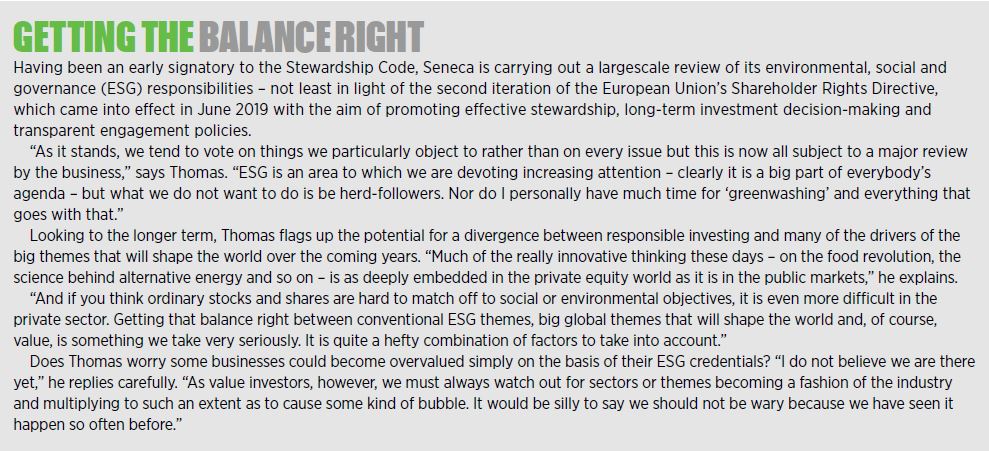
Multi-asset investment trust popular with DFMs
On the subject of making a case to professional investors, are multi-asset funds a tougher sell to DFMs and other fund selectors? Might they not, for example, feel they should be taking asset allocation decisions themselves rather than Seneca’s team of managers? “I can only speak from our own experience but where we have really found a home with the DFM end of wealth management is with our investment trust,” says Thomas.
“That may be partly because that area of the market is more culturally attuned to the use of investment trusts. Still, while the core client base for our open-ended funds is financial advisers, there are two ways we can add some value for DFMs. First, they will pretty much all have a bank of clients who are quite small and, with these portfolios, they can find it difficult to implement the full range of what they would do for a larger client.
“As such, where we have found a home is in supplying an important component part of a portfolio for the smaller client end of the market. I am not saying a DFM will put all their smaller clients’ money with Seneca but what they might do, instead of having a range of 30 or 40 holdings, say, is combine a value multi-asset play with two or three other kinds of multi-asset portfolios and maybe one or two single-strategy funds.”
In addition to providing a partial solution for smaller clients, Thomas believes Seneca can also find a home among DFMs and other fund selectors through “adding to the diversification mix” by way of the exposure the firm offers to specialist assets. These he defines as a combination of private equity, infrastructure, specialist financials and specialist property.
“As an example, we can use some of the investment trust specialists that have grown up over the last few years to provide the DFM community with an exposure to, say, three or four small specialist Reits that they as big firms – as many of them now are – would have difficulty accessing directly,” says Thomas. “Typically, in our portfolios, around 25% will now be allocated to these more specialist assets.
“And the wider reason we are looking to do that is, if you think about the bond markets – particularly the mature government and investment-grade sectors – they have now enjoyed a 40-year bull run. Of course, it is quite typical for bond markets to have very long cycles – unlike with equities, a bond-market cycle can go on for decades. Still, even by those standards, this one has now gone on for a very long time.
“And it is genuinely hard to say that much at the more conventional or higher- quality end of the bond markets is now cheap. As for equities – well, as I said, we can see plenty of value still in some parts of the market but, taking a headline view, market levels are pretty high. So it does make sense to us to be looking more widely for both growth and income for our investors.”
Thomas goes on to stress that the business’s focus on specialist property has no liquidity implications because “we absolutely do not use open-ended property funds”. “We are very mindful of liquidity,” he continues. “One of the advantages of being the size we are compared with some of the really big players is we can invest in relatively small or mid-cap specialist investment trusts without falling too foul of the liquidity in those markets.
“That is because we are not trying to buy 20% of any company but perhaps 3% or 4%. As for open-ended property funds, we just view them as a difficult combination of liquidity and product. We do not directly own any unquoted assets either and, as a matter of policy, we run a serious liquidity analysis on all of our funds on an ongoing basis.”
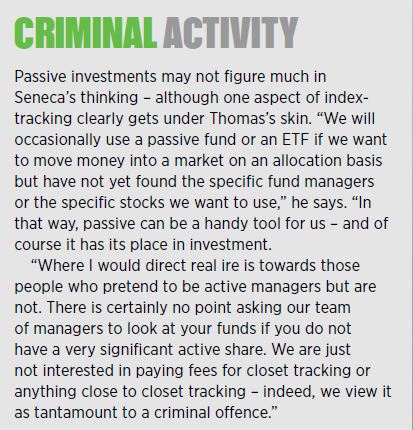
‘Culture eats strategy for breakfast’
My almost inevitable segue from liquidity to a question on trust in financial services prompts Thomas to recall: “When I was young, someone once told me that ‘culture eats strategy for breakfast – and the older I get, the more I believe it. It is not an original thought but, if the people in your business are not motivated, committed and treating each other properly, you are in danger of creating a mess.
“Culture is hugely important and something we have worked on very hard at Seneca. We try to foster an open culture in which people take responsibility, in which there is a positive ‘can-do’ attitude, in which everybody is treated with respect and in which everybody can have their say. It is not unusual, for example, for a relatively junior member of staff to get in touch with me to express a concern – and I am entirely open to that.
“More broadly, you have to think like this because there has been so much damage to trust in financial services. To be in a position to expect your business to treat its clients as you would wish them to be treated, you absolutely need to embed the sort of culture I have described. Sadly, I think everybody in financial services still has a huge amount of work to do to fully regain public trust.”
Looking to discover how Thomas would characterise the relationships between asset managers, intermediaries and end-investors, I use the expression ‘balance of power’.
“I don’t know if any clients think in those terms,” he replies diplomatically. “Any healthy adviser-client relationship is really based on trust rather than power. That said, obviously, the relationship also only works if the adviser is providing something the client wants.
“In that sense, then, clients have the ultimate say because it is their money that is at stake. As for the relationship between advisers and fund managers, clearly it is the advisers who choose which fund managers to use and, now they are remunerated by their clients – quite rightly – they should be able to do that on the basis of what they genuinely think is right. So advisers do have a degree of power over fund managers.
“For our part, we believe there should always be a role for businesses like ours that are reasonably innovative in what they do, take great care to look out for their client base and can differentiate themselves strongly from the broader field – in our case, as value-driven multi-asset investors. In the end, the only way asset managers can have any power themselves is if they are offering something investors want.
“Ultimately, then, our fortunes as asset managers are in our own hands and, if we can produce attractive products, returns and service for advisers and their clients, that is what gives us our seat at the table.”
